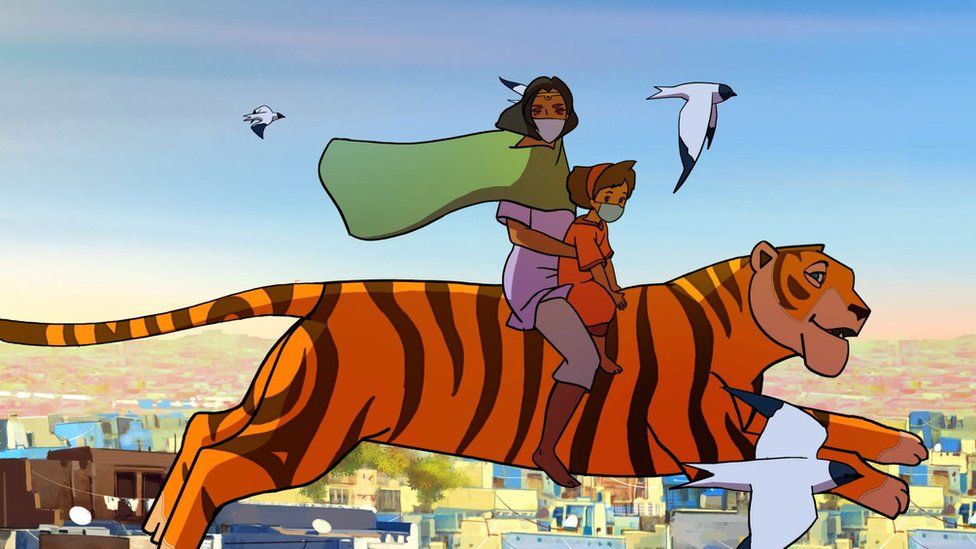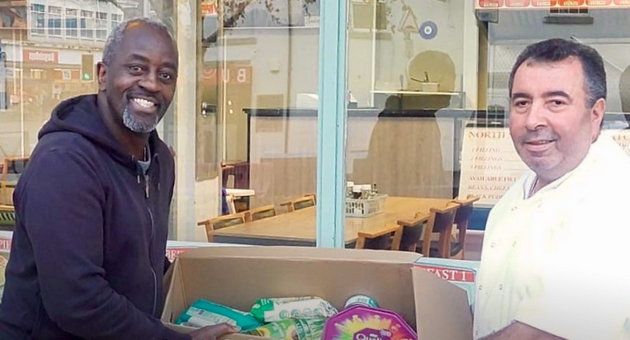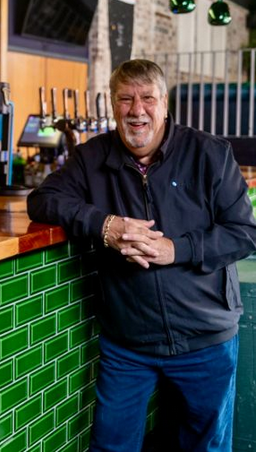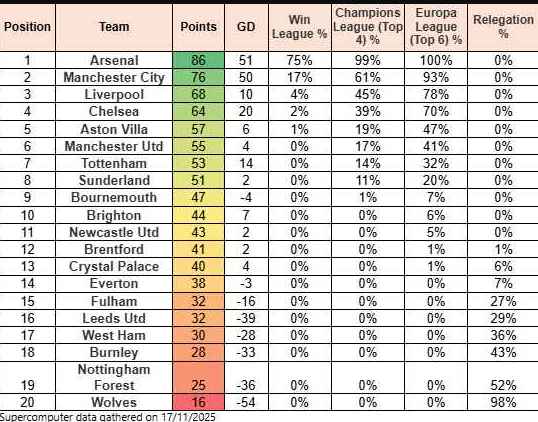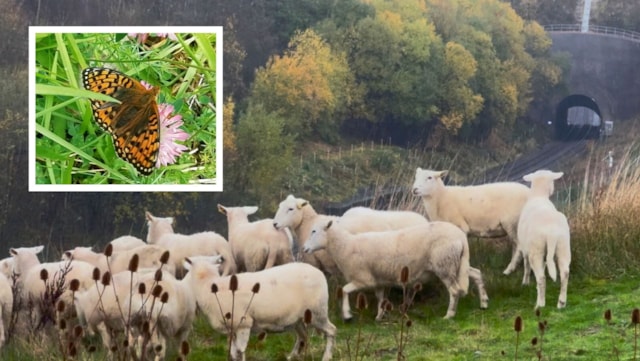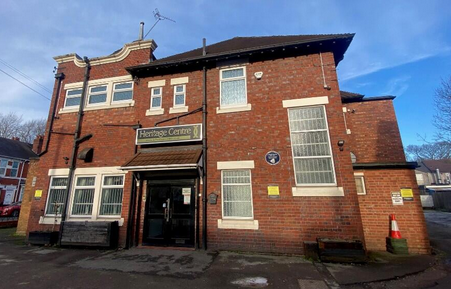India's first female comic superhero Priya, a gang-rape survivor who earlier campaigned against rape, acid attack and sex trafficking, is back to fight disinformation around the Covid-19 pandemic. In Priya's Mask, due to be launched on 2 December, the comic crusader joins hands with Jiya, the "Burka Avenger", a popular character from a Pakistani cartoon show, as the two go about trying to tackle the pandemic - and also the "infodemic", a major proliferation in fake news surrounding the coronavirus.
With more than 9.4 million infections and 137,000 deaths, India has the second highest caseload globally. A strict nationwide lockdown that was imposed on 21 March delayed the spread for a while, but infections grew rapidly - and continue to do so - since restrictions were relaxed. A major challenge in India's fight against Covid-19 has been the false and misleading information around the pandemic, which is often shared at lightning speed.
Since the first infections were reported earlier this year, millions of people with smartphones have received hundreds of messages each about supposed cures, lockdown rumours and conspiracy theories on Covid's origins. Claims that frequently sipping warm water, shunning meat and poultry, or taking homoeopathic medicine could prevent infection have regularly landed in people's inboxes.
Fear and carelessness have seen people flouting orders to wear masks in public places or maintain social distancing. In some places, frontline workers, including doctors and nurses were attacked, even barred from their own homes by neighbours fearful of catching the virus.
The creator of the Priya comic Ram Devineni series, said: "Through this campaign, we wanted to challenge misinformation, dispel fear, and support the health workers and others at the forefront of the fight against the virus."
He launched the "modern-day feminist superhero" in December 2014, two years after the brutal gang rape of a young woman on a bus in Delhi, to focus attention on the problem of gender and sexual violence in India. The series has subsequently been named a "gender equality champion" by UN Women. In Priya's Mask, she arrives riding the flying tigress Sahas (Hindi for courage), to battle "an invisible monster - a deadly virus unlike any we've seen before".
As she flies into the city, she sees masses fleeing on foot - a reminder of the early days of the lockdown in India when tens of thousands of poor migrant workers walked for days to return home while factories, offices and transport shut down. "There's a quiet sense of fear. Everyone is hiding in their homes. It seems as though time has stopped," she observes.
Delhi-based writer and theatre actress Shubhra Prakash, who wrote the script of Priya's Mask, says she incorporated her personal experiences into the story.
"During the early weeks of the lockdown, we were not allowed to leave home at all. So I spent a lot of time in my balcony. My access to the world was quite restricted. We were all isolated and it was difficult for everyone. So when you see Meena, a little girl who's one of the main characters in the story, standing alone in her balcony, daydreaming, that was also me.
"And when the lockdown began to ease and we could step out, a 'new normal' emerged. We had to wear masks and maintain social distancing," she says. In Priya's mask, Meena is invited to hop on to Sahas' back for a tour of the becalmed city.
They see deserted roads; Meena spots her favourite ice-cream parlour where no one is queuing up any more; she sees her friend who's as isolated as she is; and hears voices - at times irrational and fearful. At the hospital, she watches her mother, a nurse, heroically tending to Covid-19 patients.
"We wanted people to understand that these are extraordinary times. And we wanted to highlight the role of Covid heroes since we felt they were not being talked about much," Ms Prakash says. "There was a lot of stigma surrounding the illness and we were trying to say that people need to be open-minded. What is keeping the world moving during the pandemic? The sacrifices made by the frontline workers, who go to work to keep us safe."
In the comic, Priya also partners with Jiya, the Burka Avenger, who's fighting to protect her city Chutneyville against a villainous assault by Baba Kaboom, who plans to take it over by not wearing a mask and spreading the virus. But, in the process, he himself catches Covid and needs help from Priya and Jiya.
"The most important message it conveys is we have to look at the world with compassion and not give up on humanity. We can only conquer the virus if we work together," Ms Prakash says. Indrani Ray, co-producer of a two-minute animation film based on Priya's Mask (seen at the top of this story), says the pandemic has impacted everyone's life and although "our lockdowns are different, our experiences are the same".
Ms Ray, who lives in Mumbai, says her parents live in Kolkata and she has not been able to see them the entire year. "I'm afraid to visit, just in case I carry the infection and pass it on to them." Her colleague Tanvi Gandhi says her involvement in the project was in part due to personal loss. "I lost someone in my family to the virus, and it all happened so quickly. In a matter of four weeks, it was all over.
"That's when you realise it's not just a statistic, not a social media forward, it's something very tangible that is impacting all of us. It is as real as it can get." The animation is voiced by feminist icons in Bollywood and Hollywood, including Rosanna Arquette, Vidya Balan and Mrunal Thakur and 12-year-old Sairah Kabir. The comic, which targets young people and has augmented reality features, can be downloaded for free anywhere in the world. Mr Devineni, who lives in the US, says Priya's Mask would have relevance not just in India, but globally since the pandemic has impacted people across the world.
"New York, where I live, looked post-apocalyptic. And if you see images from European cities, many of them did too. Every time I stepped out, I could only see homeless people, it was surreal, the eeriest site I've ever seen." His father, a paediatrician who has practiced in South Jersey since 1975, had to stop working for the first time since he was in the vulnerable group for Covid-19.
"He's 80 and has health complications and we knew if he got it, he would have just died. In fact, two of his very close doctor friends - I had grown up calling them uncles - died from Covid. We watched their funerals on Zoom."
Mr Devineni says when the US embassy in Delhi got in touch with him in April, asking if he'd be interested in creating a new Priya comic to launch in December for the United Nation's 16 Days of Activism Against Gender-based Violence, "I wondered if we would be outdated by then".
"I knew the virus would still be there and the campaign would have some resonance. Also, 10 years from now, this artwork, created during the pandemic would be a historical document, a documentation of how people dealt with it at the emotional and visceral level," he says, adding, "but I think it's going to be much more than that."
For, almost a year since the pandemic began spreading, large parts of the world are still in the grip of the virus. In Delhi, and the US, numbers continue to explode as the global infections cross 62 million, with 1.5 million dead. And the World Health Organisation and governments in many parts of the words are still finding it a challenge to get people to wear masks or maintain social distancing. Last month, Delhi government raised the fine for not wearing masks in public from 500 rupees ($7.50; £5.00) to 2,000 rupees after repeated warnings fell on deaf ears.
And that, Mr Devineni says, means that Priya's Mask has more relevance than ever.



